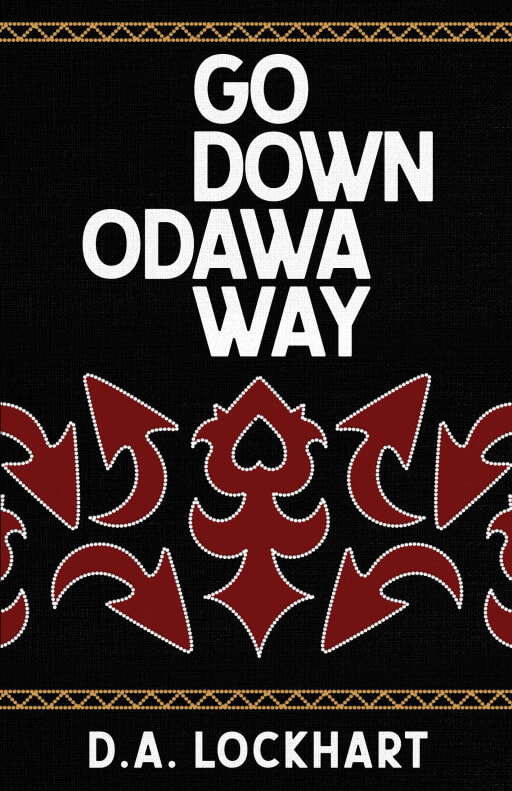Go Down Odawa Way
|
|
D. A. Lockhart’s latest collection, Go Down Odawa Way, is, as the title suggests, deeply rooted in place. It begins with an epigraph from Campbell McGrath: “Is not the very earth we stand upon build from the bones of the past?” And the poems in the book weave together the past and present of Southwestern Ontario and the American Midwest, grounding themselves in a profound attentiveness to the histories, cultures and landscapes of the places out of which they emerge. The region referred to in the title straddles the Canadian-American border and the great lakes. It is a geography of water, and the poems in this collection are river poems, poems about rivers, but also poems whose structures and rhythms follow the logic of water, poems that meander, that move with an extraordinary fluidity from one register to another, and then another, but that never fail to arrive a conclusion that is as satisfying as the winding lines that brought you there.
The section title “MPI” or water contains a suite of poems that trace the paths of rivers, such as the Rouge River and the Clinton River. The poem for the Rough River is particularly notable:
Notice the place between natural and unnatural elements—the river that passes “lowrise / office buildings” only to be compared to a rattle snake bite, and to then be reconnected to post-industrial modernity by the phrase “shopping cart rapids.” Notice also the play of sound across the lines, the way that “glass” and “past,” and “skyward” and “shore” echo each other without, strictly speaking, rhyming.
The fluid shifting back and forth between natural and unnatural elements is typical of a collection whose poems move effortlessly though disparate elements. They often gather together apparent opposites, holding them alongside each other while maintaining their differentiation, reproducing in the poems the logic of a place, at least in so far as the places Lockhart writes about are defined by multiple and contradictory histories, cultures, etc. The result is a unity, not so much of content, as of vision, a clear sight of the layered multiplicities and complexities of place. For example, take the ending of “Otto E. Eckert Station Taunts Fire to Grandmother”:
The first sentence ends with creation, the second with air conditioners. Grandmother and energy plant are held together by the poem’s capacious gaze.
As it traces the contradictions of place, the book builds on Lockhart’s interest in working- and lower-class lives that has been a feature of his work since he began publishing. In “Swallows Sing the Night to Sleep at Lansing Station,” he writes about factory workers:
In one poem, “neon bars of sunlight [shine]through Faygo bottles.” In another,
There is a deep authenticity to this dimension of the poems that is, I think, due as much to reverence as to experience: the poems celebrate these lives, their contents and their rituals, with the same wonder and fervor with which they hymn the natural world. It is rare and refreshing to see this material treated in this way, woven into the poems so that it, so that urban decay, Kowalski sausages, and Faygo, is continuous with history and spirituality.
I began this review by noting that the poems in the book follow the logic of rivers, and what I mean by that is that they are protean in their structures, following the topography of their content, so that form is naturalized, becomes essential, even inevitable. The opening poems spread out across the page, inserting stretches of white space into the lines, slowing them close to stillness. Several others begin their stanzas with right justified lines follow by shorter lines indented in a column, such as this stanza from “Finding Indigenous Drift Along Hines Park Drive”:
A pair of sentences that neatly captures the collection’s approach to form. The poems slip past the reader with an almost conversational ease, but they will also reward anyone who pauses to examine the complexity and care with which they are constructed
Lockhart is a prodigiously productive poet, and what is most impressive about his productivity is the consistent quality of his work, its range, but, also and just as importantly, the uniqueness of its voice and vision. Go Down Odawa Way is a powerful addition to a corpus that is increasingly becoming essential reading. Aaron Schneider is a Founding Editor at The /tƐmz/ Review. His stories have appeared/are forthcoming in The Danforth Review, Filling Station, The Puritan, Hamilton Arts and Letters, Pro-Lit, The Chattahoochee Review, BULL, Long Con, The Malahat Review and The Windsor Review. His stories have been nominated for The Journey Prize and The Pushcart Prize. His novella, Grass-Fed, was published by Quattro Books in the fall of 2018. His collection of experimental short fiction, What We Think We Know (Gordon Hill Press) was published in the fall of 2021, and his novel, The Supply Chain (Crowsnest Books), is forthcoming.
|


